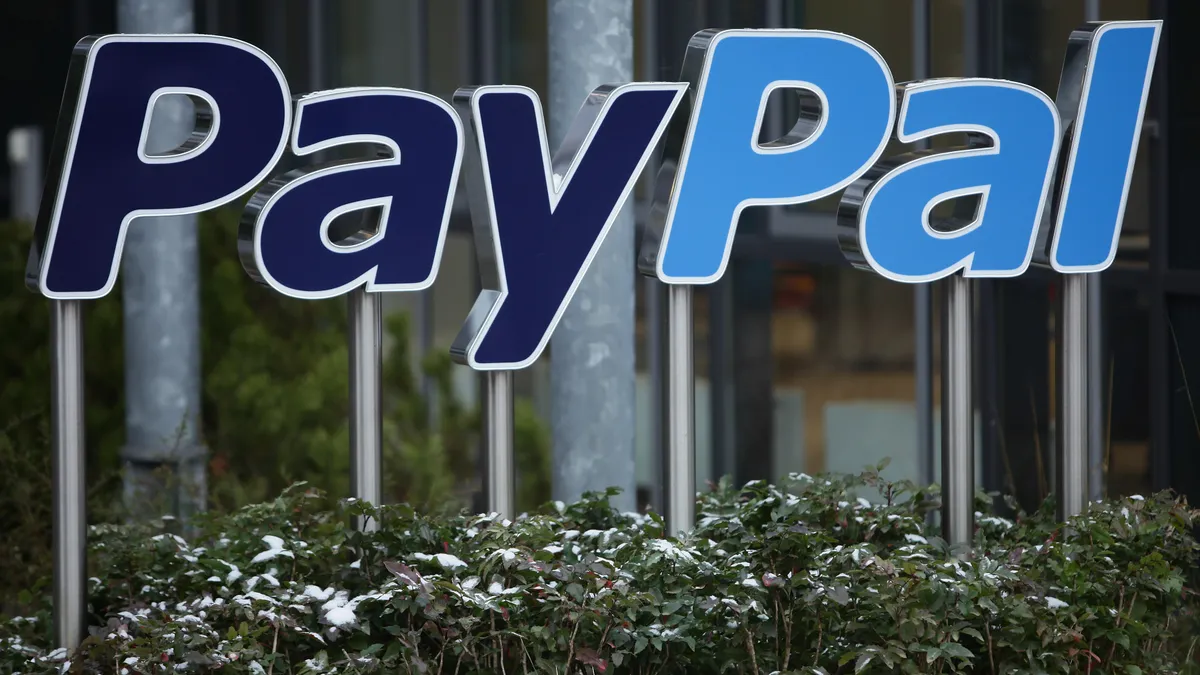Dive Brief:
- Digital payments pioneer PayPal on Monday said it’s launching a U.S. dollar stablecoin for payments and transfers, according to a news release.
- Pegged to the U.S. dollar, PayPal USD is issued by Paxos Trust Company and built on the Ethereum blockchain, said San Jose, California-based PayPal. It’s backed by U.S. dollar deposits, short-term U.S. Treasuries as well as similar cash equivalents.
- As the stablecoin is made available to PayPal’s U.S. customers in the coming weeks, users will be able to transfer PayPal USD between their PayPal wallet and compatible external wallets, send peer-to-peer payments and pay for purchases using the stablecoin, and convert the company’s supported cryptocurrencies to and from PayPal USD, the release said.
Dive Insight:
PayPal is planting a flag in the stablecoin space despite digital assets being slow to infiltrate the consumer payments arena and the lingering chill tied to the downfall of FTX and others in the crypto world.
Still, PayPal envisions its stablecoin reducing payments friction in virtual environments, being used to send remittances or cross-border payments and generally bolstering the use of digital assets. The stablecoin will be available on its peer-to-peer app Venmo soon, the company said in the release.
“The shift toward digital currencies requires a stable instrument that is both digitally native and easily connected to fiat currency like the U.S. dollar,” said PayPal CEO Dan Schulman in the release. “Our commitment to responsible innovation and compliance, and our track record delivering new experiences to our customers, provides the foundation necessary to contribute to the growth of digital payments through PayPal USD.”
Earlier this year, PayPal shelved its stablecoin plans due to regulatory scrutiny, Bloomberg reported. Additionally, Facebook parent Meta ditched its stablecoin plans last year.
PayPal said Monday it’s “focused on increasing consumer and merchant comprehension” of digital assets, “while working closely with regulators as the industry evolves,” according to the release.
Rep. Patrick McHenry (R-NC), chairman of the House Financial Services Committee, applauded PayPal’s launch. “This announcement is a clear signal that stablecoins — if issued under a clear regulatory framework — hold promise as a pillar of our 21st century payments system,” McHenry said in a Monday statement.
In June, Federal Reserve Chair Jerome Powell said the central bank should have a “robust” role overseeing stablecoins, CoinDesk reported. Last month, the House Financial Services Committee passed the bipartisan Clarity for Payment Stablecoins Act, which lays out regulatory paths for the approval and regulation of stablecoin issuers while establishing consumer protections through federal guardrails for payment stablecoins.
“Clear regulations and robust consumer protections are essential to enabling stablecoins to achieve their full potential,” McHenry said in the statement. “That’s why it’s more important than ever that Congress enact legislation to provide comprehensive digital asset regulation, especially for stablecoins.”
PayPal’s move indicates the company feels confident in the direction things are headed in Washington with regard to stablecoin legislation, “that they aren’t investing in an area that’s likely to be completely shut down,” said Rohan Grey, an assistant professor of law at Willamette University’s College of Law in Salem, Oregon.
“I could imagine PayPal starting to skate to where the puck is going,” said Grey, who’s also the research director of the Digital Fiat Currency Institute.
To Grey, PayPal’s move points to the line between money transmitter and stablecoin issuer getting blurrier. “We are seeing stablecoins increasingly becoming the new technological metaphor for all kinds of money and money substitutes,” he said.
Grey wouldn’t be surprised to see PayPal’s move be scrutinized by the Consumer Financial Protection Bureau, given Director Rohit Chopra’s eye on the payments industry. “I can certainly see him taking an interest in this, and I think PayPal is certainly on his radar in a very serious way,” Grey said.
Other money transmitters may follow PayPal’s stablecoin move, including Block’s peer-to-peer payments business Cash App, Grey said. A former PayPal executive agreed the company’s move could inspire rivals.
“There’ll be a lot of people watching it over the next six months to see what happens and whether anything does,” said Olivia Micallef, chief operating officer at startup Settle, who spent seven years at PayPal and Venmo.











